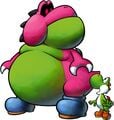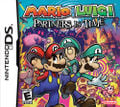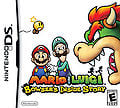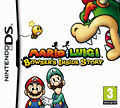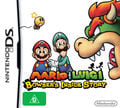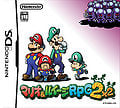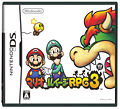Mario & Luigi (series): Difference between revisions
m (replaced image) |
|||
| Line 56: | Line 56: | ||
|input=Buttons, Stylus, Microphone | |input=Buttons, Stylus, Microphone | ||
}} | }} | ||
The third installment, ''[[Mario & Luigi: Bowser's Inside Story]]'', was announced at Nintendo's Fall Press Conference on October 2nd, 2008.<ref>[http://www.nintendo.co.jp/n10/conference2008fall/mov/ds.html?n10 Nintendo fall 2008 conference]</ref>The game has been released so far in Japan, the United States and Europe. While Mario and Luigi are still playable, [[Bowser]] becomes | The third installment, ''[[Mario & Luigi: Bowser's Inside Story]]'', was announced at Nintendo's Fall Press Conference on October 2nd, 2008.<ref>[http://www.nintendo.co.jp/n10/conference2008fall/mov/ds.html?n10 Nintendo fall 2008 conference]</ref>The game has been released so far in Japan, the United States and Europe. While Mario and Luigi are still playable, [[Bowser]] becomes a central protagonist in this game as he attempts to reclaim both the Mushroom and Koopa Kingdoms from Fawful, who used an outbreak of a disease known as the [[Blorbs]] as an opportunity to launch his own evil plot for world domination. Fawful later gave Bowser a [[Vacuum Mushroom]], making Bowser inhale everything around him, including Mario, Luigi, Princess Peach, and other characters. Afterwords, Bowser is aided by the Mario bros., who spend most of their time traveling around inside his body, having been inadvertently ingested by the Koopa King's new vacuum ability from Fawful. Mario and Luigi can also exit Bowser's body later in the game to overcome their own obstacles. After many happenings in the game, Fawful uses a strange raygun to pull Princess Peach from Bowser's Body, and then using her to awaken the [[Dark Star]], a powerful star that had the power to destroy the kingdom. Fawful later becomes [[Dark Fawful]] and takes over Peach's castle, which surrounded in a barrier made by the Dark Star. To break the barrier, Mario, Luigi, and Bowser must search for the Star Cures, which they successfully do. In the end of the game, the two heroes and anti-hero foil Fawful's plans and save the Mushroom Kingdom. | ||
<br clear=all> | <br clear=all> | ||
Revision as of 21:45, November 3, 2010
Template:Series-infobox The Mario & Luigi series is a trilogy of Role Playing Games released for Nintendo's handhelds, starting in 2003 with Mario & Luigi: Superstar Saga for the Game Boy Advance. Each title has Mario and Luigi team up for a meandering quest in which they must battle evil, all the while completing various and often banal side-quests. More playable characters were introduced in the latter two Mario & Luigi games. The series is renowned for its inventive plots and humorous dialogue, and is notable for maintaining continuity between the three installations (Particularly the development of fan-favorite villain, Fawful).
History
Mario & Luigi: Superstar Saga
Template:Infobox
The first game in the series was Mario & Luigi: Superstar Saga, released 2003 for the Game Boy Advance. In the game, two new villains, Cackletta and Fawful, steal Princess Peach's voice. Mario and Luigi, of course, jump into the action and travel to to the Beanbean Kingdom to stop them. It is later found out that Cackletta had stolen Peach's voice to awaken the Beanstar, a powerful star that can grant all wishes, such as letting Cackletta rule the world, that is only awakened by a pure voice. Princess Peach happened to be the one with the "Pure" voice. However, after a series of events, Cackletta and Fawful had really stolen Birdo's voice, which irritated the Beanstar and made it break into four pieces. Before Mario and Luigi searched for the pieces, they took Peach to a safe place, in Little Fungitown. While in little Fungitown, Cackletta was revealed to become Bowletta, who was Bowser being possessed by Cackletta. Bowletta had captured Peach and told the Mario Bros. to collect all four pieces of the Beanstar, or never get the Princess back. As told, Mario and Luigi found both pieces and after more events, stole back Princess Peach without losing the Beanstar. Afterwords, Mario and Luigi defeated Bowletta and brought back peace to the Beanbean and Mushroom Kingdoms. Unlike previous Mario games, it took place in the neighboring Beanbean Kingdom. Superstar Saga was Mario and Luigi's first adventure together since Super Mario World twelve years previously.
Mario & Luigi: Partners in Time
Template:Infobox
A sequel to Superstar Saga was made for the Nintendo DS in 2005, called Mario & Luigi: Partners in Time. This game centered on the Mushroom Kingdom of the past, during the invasion of an alien race known as the Shroobs. Unaware of the danger, Princess Peach uses a Time Machine build by Professor E. Gadd to travel into the past, where she was promptly captured by the alien leader, Princess Shroob. Teaming up with Baby Mario and Baby Luigi, the adult Mario bros. set off to defeat the Shroobs and save Peach, using Time Holes created by the malfunctioning Time Machine to travel back and forth through time. On their adventure, Mario, Luigi, Baby Mario, and Baby Luigi collect all the pieces (Except one which Princess Peach has) of the Cobalt Star Shards and get into Shroob Castle. The four heroes go through many obstacles and finally find Princess Peach and fight Princess Shroob. After besting her, Princess Peach reveals the final piece of the Cobalt Star, but doesn't let the four heroes have it. Mario and Luigi become puzzled, not understanding why the can't have it until Baby Bowser comes, swipes it away from the Princess, and places it into the Cobalt Star. Elder Princess Shroob appears and the bros. fight her as the final boss. The heroes beat her and Professor E. Gadd invents machine to destroy all the remains of the Shroobs, making the Mushroom Kingdoms past and present time safe. The game end with Mario, Luigi, and Princess Peach waving good-bye to Baby Mario, Luigi, and Peach, along with Toadsworth the Younger.
Mario & Luigi: Bowser's Inside Story
Template:Infobox
The third installment, Mario & Luigi: Bowser's Inside Story, was announced at Nintendo's Fall Press Conference on October 2nd, 2008.[1]The game has been released so far in Japan, the United States and Europe. While Mario and Luigi are still playable, Bowser becomes a central protagonist in this game as he attempts to reclaim both the Mushroom and Koopa Kingdoms from Fawful, who used an outbreak of a disease known as the Blorbs as an opportunity to launch his own evil plot for world domination. Fawful later gave Bowser a Vacuum Mushroom, making Bowser inhale everything around him, including Mario, Luigi, Princess Peach, and other characters. Afterwords, Bowser is aided by the Mario bros., who spend most of their time traveling around inside his body, having been inadvertently ingested by the Koopa King's new vacuum ability from Fawful. Mario and Luigi can also exit Bowser's body later in the game to overcome their own obstacles. After many happenings in the game, Fawful uses a strange raygun to pull Princess Peach from Bowser's Body, and then using her to awaken the Dark Star, a powerful star that had the power to destroy the kingdom. Fawful later becomes Dark Fawful and takes over Peach's castle, which surrounded in a barrier made by the Dark Star. To break the barrier, Mario, Luigi, and Bowser must search for the Star Cures, which they successfully do. In the end of the game, the two heroes and anti-hero foil Fawful's plans and save the Mushroom Kingdom.
Appearances of the Series
Super Smash Bros. Brawl
Artwork from the Mario & Luigi series appeared as stickers in Super Smash Bros. Brawl: Cackletta, Luigi with Baby Luigi, Luigi, Mario with Luigi, Prince Peasley, a Shroob, Stuffwell, and Toadsworth. Additionally, one of the random names in Brawl when naming something (for example, naming a friend code) is FWFUL, obviously referencing Fawful. Additionally, Gritzy Desert's music from Mario & Luigi: Partners in Time is selectable as the Mushroomy Kingdom's stage music.
Items
The series features many items.
| Image | Name | Description |
|---|---|---|
| Mushroom | Recovers 25 HP/30 HP. | |
| Super Mushroom | Recovers 50 HP/60 HP. | |
| Ultra Mushroom | Recovers 120 HP. | |
| Max Mushroom | Recovers all HP/240 HP. | |
| Hot Drumstick | Recovers 80 HP. | |
| Fiery Drumstick | Recovers 150 HP. | |
| TNT Drumstick | Recovers 280 HP. | |
| Mushroom Drop | Recovers 15 HP (all). | |
| Super Drop | Recovers 30 HP (all). | |
| Ultra Drop | Recovers 60 HP (all). | |
| Nut | Recovers 20 HP (each). | |
| Super Nut | Recovers 40 HP (each). | |
| Ultra Nut | Recovers 100 HP/80 HP (each). | |
| Max Nut | Recovers all HP/160 HP (each). | |
| File:Syrups.PNG | Syrup | Recover 20 BP/10 SP. |
| File:Syrups.PNG | Super Syrup | Recover 40 BP/20 SP. |
| File:Syrups.PNG | Ultra Syrup | Recover 100 BP/30 SP. |
| File:Syrups.PNG | Max Syrup | Recover all BP/40 SP. |
| File:Ultra Mushroom.PNG | 1-Up Mushroom | Revives a fallen brother with half of his max HP. |
| File:Ultra Mushroom.PNG | 1-Up Super | Revives a fallen brother with all HP |
| Refreshing Herb | Used to get rid of status ailments. | |
| File:Green pepper65.png |
Green Pepper | Boost DEF and/or get lighter. |
| File:MLSuperStarSagaREDPEPPER.png |
Red Pepper | Boost POW and/or weight. |
| Blue Pepper | Raises SPEED. | |
| File:Bean.png | HP Bean | Increases health by 1. |
| File:Bean.png | POW Bean | Increases power by 1. |
| File:Bean.png | DEF Bean | Increases defense by 1. |
| Golden Mushroom | Recovers Max HP and BP. | |
| Star Candy | Recovers 999 HP and SP. |
Gallery
Main Characters
- SAGAMARIO.JPG
- ML2Luigi.jpg
- MnL2 BabyMario.jpg
- MnL2 BabyLuigi.jpg
- ML3Bowser.jpg
- Babybowser.jpg
- BabyPeach.jpg
- Toadsworth old.jpg
- Toadbertmlbis.PNG
- MnL ProfessorElvinGadd.jpg
- MLSSpopple.jpg
- Kawaiistar3.png
- Cackletta.jpg
- Princessshroob.jpg
- NTR MarioLuigi3 07char E3.jpg
Box Covers
- Superstars.PNG
Mario & Luigi: Superstar Saga
- MarioAndLuigi3Germany.png
Mario & Luigi: Bowser's Inside Story German Boxart
- MLRPGBox.png
Mario & Luigi RPG Japanese Boxart
Screenshots
Mario & Luigi: Superstar Saga
Mario and Luigi fighting two Goombas.
Mario and Luigi battling Tolstar.
- Marioluigiss 004-large.PNG
Walking around in the overworld of Superstar Saga.
- Dragohoho.PNG
Mario and Luigi battling the boss, Dragohoho.
- ChucklehuckWoods65.png
The Mario Bros. in Chucklehuck Woods.
- Wohoostars65.png
Mario and Luigi in the Woohoo Hooniversity.
- OhoOasis.gif
Mario and Luigi in Oho Oasis.
- Underwateradventures65.png
Mario and Luigi underwater.
- Fungiland65.png
Mario and Luigi in Little Fungitown.
- Jokes end pic 65.png
Mario and Luigi at Joke's End.
- Bowsers castle invasion 65.png
The bros. in Bowser's Castle.
Mario & Luigi: Partners in Time
Luigi looks into a Time Hole in the beginning of Partners in Time.
- Mario and luigi partners in time 20051027.jpg
A battle scene in Partners in Time.
- Toadwood65.png
Mario and Luigi in the Toadwood Forest.
- Vimhammer65.jpg
- Spinmariospin.jpg
Mario and Luigi learn a new move.
- Yoobshot.jpg
In the overworld of Partners in Time, meeting Yoob
- BabyBowserStoleThem!.png
Baby Bowser stealing Cobalt Star's shards.
- MandL2 GritzyDesert.jpg
The bros. in Gritzy Desert.
- Gritzy Caves.PNG
The heroes near Petey Piranha.
- Ml2 pic 2.jpg
The heroes in Star Hill.
Mario & Luigi: Bowser's Inside Story
The effect of the Blorbs.
- Bis fight65.jpg
Bowser fighting Treevils
- Spikeblopandgoombule.JPG
Mario and Luigi fighting in the Trash Pit.
- BattleML3.Jpg
A battle scene from Bowser's Inside Story
- Destrooyy mlbis.png
The destroyed machine that protected the Dark Star.
- Booraymachine2.PNG
Yikk presents the Boo-Ray Machine.
- Fawful Express.PNG
Bowser encounters the Fawful Express.
Bowser fights Dark Fawful.
Similarities Between the Games
- The Mario bros. have been inside someone's body in the three games (Bowletta's belly in Mario & Luigi: Superstar Saga, Yoob's belly in Mario & Luigi: Partners in Time and Bowser's and a giant Sockop's body in Mario & Luigi: Bowser's Inside Story).
- The three games have their own version of the Mushroom Kingdom enemies (Mario & Luigi: Superstar Saga have bean-related enemies, Mario & Luigi: Partners in Time have Shroobified enemies and Mario & Luigi: Bowser's Inside Story have Fawful-themed, organ-themed and Dark Star-themed enemies).
- All three games have similarities between the boss fights, starting with the fact that Bowser is always the first boss.
- During the initial Bowser fights, Mario learns the action command while Luigi is occupied with something else (watching in Mario & Luigi: Superstar Saga, playing in Mario & Luigi: Partners in Time and sleeping in Mario & Luigi: Bowser's Inside Story).
- In all three games, Bowser or a similar being must be battled (Bowser, Rookie and Bowletta in Mario & Luigi: Superstar Saga, Baby Bowser, Bowser and Shrowser in Mario & Luigi: Partners in Time and Bowser, Bowser X and Dark Bowser in Mario & Luigi: Bowser's Inside Story).
- All three games have at least one boss that only gives the player a limited number of turns to defeat before Game Over. The bosses are: Roy Koopa, Wendy O. Koopa, and Larry Koopa in Superstar Saga, three Shroobs in Hollijolli Village, and Elder Shrooboid in his larger form in Partners in Time, and Fawful Express and X bosses in Bowser's Inside Story (though the X Bosses do not give a Game Over, rather they are just pulled away from the battle).
- In all three games, there is at least one Wiggler boss.
- In all three games, an effected form of Bowser is the final Boss (Bowletta, Shrowser, and Dark Bowser).
- On that note, two of the final bosses (Cackletta in Superstar Saga and Fawful in Bowser's Inside Story) are fought inside Bowser.
- The first two games have one character that is stuck and needs help, but as soon as they are rescued, something bad would happen and are not seen for the remainder of the game. In Superstar Saga, Bloat is stuck in a gap, and after he is rescued, the S.S. Chuckola starts to move out to the Oho Ocean, and sinks. In Partners in Time, the Hollijolli Mayor is stuck in a chimney, and after he is rescued, Shroob UFOs come and kidnap him.
- All three games' storyline is about collecting the pieces of a Star or another magic item (the Beanstar in Superstar Saga, the Cobalt Star in Partners in Time and the Miracle Cure in Bowser's Inside Story).
- The Final Bosses of all three games are defeated by eliminating parts of the bosses' body to conceal a weak point: Cackletta's arms, legs, and head must be destroyed to make attacking her heart possible, the Elder Princess Shroob's tentacles must be destroyed to conceal her crown, which after being de-activated will drop the boss's defense, and finally, the Dark Fawful Bug needs it's arms, legs and glasses to be destroyed so the player can attack the Dark Star Core.
- All three Mario & Luigi games have an elite version of an enemy. In Superstar Saga, there is an elite version of the Troopea called the Elite Troopea, in Partners in Time, there is an elite version of a Boom Guy called the Elite Boom Guy, in Bowser's Inside Story, there was an elite version of the Goombule called the Elite Goombule
- All games have the bosses exploding, and the enemies disappearing or a small explosion.
- Each game in the series start somewhere in Princess Peach's Castle.
- Each game's last area to explore is in a castle.
- The main antagonist takes over Peach's and/or Bowser's Castle in the game. In Superstar Saga, Bowletta takes over Bowser's Castle. In Partners in Time, Princess Shroob takes over Peach's Castle of the past. In Bowser's Inside Story, Fawful takes over both castles.
- All three has at least two new characters with at least a different speech patterns or language. Superstar Saga has Fawful's odd metaphors and Cork and Cask's French accents. Partners in Time features the Shroob language and Kylie Koopa's slang. Midbus of Bowser's Inside Story with his broken, poor English and th Emoglobin's odd vocal patterns.
- All three games have a move where the player can spin or drill into the ground.
- All 3 games have their host system appear in the game somewhere (a purple then a yellow Game Boy Advance is used as a message device by Bowletta in Mario & Luigi: Superstar Saga, the DS Radar - actually a grey Nintendo DS - is used by E. Gadd in Mario & Luigi: Partners in Time, and Dark Fawful uses a red Nintendo DSi to pursue the Dark Star in Mario & Luigi: Bowser's Inside Story).
Trivia
- In this series, Mario's "M" and Luigi's "L" are black, unlike their other appearances. The same goes for their eyes. Also, Luigi seems redesigned.
- In each game, Luigi's overalls are darker than the last.



